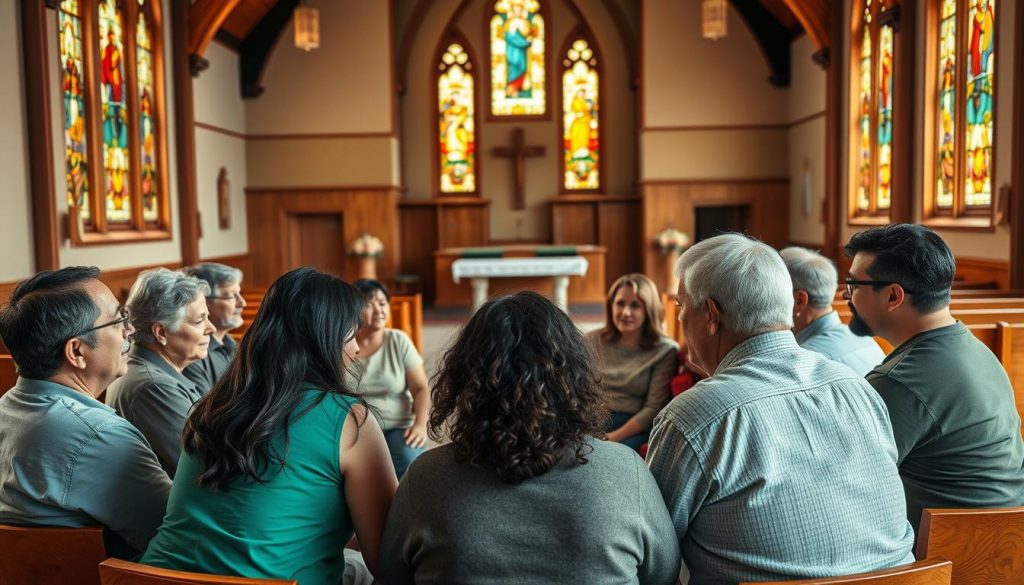Ever thought about how faith-based recovery programs use scripture and accountability? These elements are crucial for long-term dependency recovery. They mix healing of the spirit with practical steps to stay sober. Christian programs on long-term dependency recovery focus a lot on using scripture. They highlight being accountable, setting goals, and being open about problems. James 5:16 talks about sharing our mistakes and praying together.
Choosing a faith-based path, like our dependency counseling, builds a strong recovery base. It’s about more than just stopping bad habits. It means starting a new life with support from a loving community. Scripture and accountability help us fight addiction and find a sober, fulfilling life.
Understanding Long-Term Dependency Recovery
On the road to lasting long-term dependency recovery, knowing the different recovery stages is key. We follow faith-based values to move through each phase with hope and strength. From the first steps of detox to building lifelong habits, every step requires specific, enduring strategies. Our journey’s true power comes from giving our struggles to God and following His path. The journey to recovery is also a journey of spiritual growth. Christ’s love keeps us grounded when we face challenges.
Throughout this process, our eyes are fixed on both recovery and growing spiritually, creating a space where lasting sobriety is possible. Faith-based support turns avoiding substances into a deeper journey of spirit renewal. This deep change, backed by consistent faith and community, is the heart of true sobriety.
Biblical Foundation for Overcoming Addiction
When looking to beat addiction and win long-term dependency recovery, biblical teachings can offer a solid base. The Bible provides deep spiritual advice for this, reminding us we’re not alone. It offers comfort, strength, and guidance for overcoming dependency.
The Bible tells us our bodies are the Holy Spirit’s temple (1 Corinthians 6:19-20):
Do you not know that your bodies are temples of the Holy Spirit, who is in you, whom you have received from God? You are not your own; you were bought at a price. Therefore honor God with your bodies.
This view urges us to respect and care for our bodies. And, it motivates us to adopt a healthier lifestyle. The Bible is filled with stories of change and redemption. For example, the apostle Paul changed from a persecutor to a faithful Christ follower. His story shows that with faith, overcoming past issues is possible.
Moreover, having a supportive community is vital. Hebrews 10:24-25 tells us to encourage each other towards love and good deeds.
And let us consider how we may spur one another on toward love and good deeds, not giving up meeting together, as some are in the habit of doing, but encouraging one another—and all the more as you see the Day approaching.
These teachings and community support offer hope and strength. They help those recovering find their way back. In addition, biblical stories like David’s show the mix of personal effort and God’s help. Admitting our mistakes and seeking God’s guidance can lead to real change. These tales provide lessons that can aid in recovery.
Accountability in the Bible: Learning from Early Christian Communities
Understanding biblical accountability starts with early Christian groups. They gathered not just for social reasons but for deep spiritual responsibility. This deep sharing is highlighted in Acts 2:42-47. They looked after each other, showing what Christian support really means. This support was key to their strong faith. In their meetings, they would encourage, teach, and correct each other. This helped them grow spiritually strong. Their example shows us the lasting impact of having a strong spiritual network.
Biblical accountability is part of Christian support. It encourages being open and honest, keeping us faithful to our spiritual paths. Following the early Christians’ ways can greatly aid our recovery. It places us in a caring and spiritually active community. The early Christians teach us valuable lessons. By adopting their practices, we create powerful spiritual networks that help us in recovery. Building deep connections and regularly checking on our faith are key. They keep our spiritual journey alive.
Scriptural Themes Addressing Addiction
The Bible is full of wisdom and support for those fighting addiction. It gives a strong scriptural base to stand on.
- In 1 Corinthians 10:13, Paul says, “God is faithful; he will not let you be tempted beyond what you can bear.” This tells us, no matter the challenge, divine help is there to aid us in overcoming it.
- Scriptures make it clear that turning to God brings the strength we need to recover. Ephesians 5:18-20 tells us to be filled with the Spirit, not overindulgence. This leads us away from harmful habits.
- Romans 5:3-5 talks about gaining character through perseverance. It tells us, “Suffering produces endurance, and endurance produces character.” This means, recovery is a process that makes us stronger and fills us with hope. Having biblical support for recovery keeps our faith firm.
- Psalms 18:2-6 shows us the power of relying on God: “The Lord is my rock and my fortress…my shield, and the horn of my salvation.” In God, we find a solid base to face tough times. This underlines the need for spiritual help.
The value of community in faith is key. James 5:15-16 suggests we should share our sins with each other and pray together. This shows how community helps us heal and stay on the road to long-term dependency recovery. The Bible offers ways for both personal and community healing.
The Role of Christian Counseling
In overcoming addiction, adding the spiritual aspect can really help. Christian-based addiction counseling mixes faith with therapy. This creates a full path focusing on physical, emotional, and spiritual health. This type of counseling uses faith and proven treatments like cognitive-behavioral therapy. It makes sure people get care that fits their own needs. This way, they’re in a safe place where programs can get to the root of their addiction.
One big plus of Christian-based counseling is finding purpose again and strength in faith. By using scripture in sessions, counselors give hope. They help people see purpose in their journey to get better. Also, faith-based counseling offers support not just in sessions but with groups. Being part of faith-based groups strengthens the support network. This is key for staying sober and growing personally.
| Key Benefits | Faith-Based Approach |
|---|---|
| Reconnecting with Purpose | Increased Emotional Regulation |
| Reduced Cravings | Strengthened Support System |
| Holistic Healing | Scripture Integration |
Christian counseling uses scripture and accountability to help stabilize emotions. It also gives clear guidance through God’s word in long-term dependency recovery. Mixing biblical principles with therapy brings a balanced and hopeful view. For more on how this approach helps with addiction recovery, please visit this in-depth resource.
How Accountability Partners Support Recovery

Accountability is key to long-term dependency recovery. You get someone to help keep you on track with your goals. This partner cheers you on, making sure you stick to your commitments.Having an accountability partner brings many benefits. They offer both emotional support and practical advice. This helps you grow and become more resilient.
Knowing someone cares about your progress boosts your motivation. It makes you want to keep up your efforts.
- Increased Motivation: Having someone to answer to can really make you want to stick to your goals.
- Emotional Support: Sharing your challenges and wins with an accountability partner is key for your emotional health.
- Practical Guidance: Your partner can offer advice and resources that have helped others.
Our faith-based approach highlights the importance of togetherness and helping each other. The Bible, in Ecclesiasiastes 4:9-10, tells us that two are better than one.” It shows the power of having someone by your side to can pick you up when you fall down.
Leveraging the support of accountability partners can greatly improve your recovery journey. They provide the the emotional and practical backing needed for real, lasting change in long-term dependency recovery.
Incorporating Prayer in Recovery
The power of prayer in recovery can truly change lives. By turning our hearts to God, we create a special spiritual link that helps us stay strong and find peace. This practice lets us find comfort during tough times, as we follow God’s plan and accept His guidance.
Adding prayer to our daily routine connects us with our Creator. This link gives us the strength to beat temptation and problems. Seeking God’s help regularly helps us feel the true strength of prayer in recovery. It gives us the bravery to keep going, step by step.
Try creating a prayer schedule that shows your unique connection with God. It could be simple, like prayers in the morning and night, or prayers for specific issues. What’s important is that prayer becomes a key part of recovery. This lets the strength of prayer make real changes in our lives.
To understand prayer’s role, think about how it fits into your life and aids your healing journey.
Here are some tips on how to include prayer in your long-term dependency recovery journey:
| Prayer Time | Focus | Scripture Reference |
|---|---|---|
| Morning Prayer | Start the day with gratitude | Psalm 118:24 |
| Midday Prayer | Seek strength and guidance | Philippians 4:13 |
| Evening Prayer | Reflect on the day and seek forgiveness | 1 John 1:9 |
| Crisis Prayer | Immediately turn to God in times of struggle | Psalm 46:1 |
Prayer in recovery is more than a habit; it’s a deep spiritual conversation that can change our lives forever. We invite you to use this powerful tool and see God’s miraculous work in your life.
Effective Use of Bible Studies in Recovery
Starting a long-term dependency recovery journey is full of challenges. But, using Bible study in addiction recovery can really help you. It’s clear how life-changing this practice can be as we see its benefits.
First, Bible study creates a stable space to dive into the Word. This structure helps with stability and routine during recovery. Also, the Bible is rich with stories teaching about perseverance, faith, and coming back stronger. These teachings reinforce that change and healing are within reach.
Furthermore, Bible study builds community and togetherness. Being part of group studies helps form strong bonds and offers support. Support that comes from understanding what others are going through is vital. This connection is both uplifting and holds you accountable.
Study of the Bible also teaches self-reflection. It lets you think deeply and find strength from your beliefs. Learning from biblical stories and connecting them to your life brings clear vision and renewed purpose. Let’s unite, lean into the Word, and grow stronger together. By supporting each other and focusing on the Bible’s teachings, recovery becomes a journey filled with hope and guided by a higher power.
The Importance of Christian Support Groups
The role of Christian support groups is crucial when it comes to recovery. In these groups, people don’t just find emotional support. They also get spiritual guidance that brings them closer to God. Having a spot in faith-based recovery communities means sharing both struggles and wins. This creates a caring place that helps everyone keep going.

Christian support groups treat the soul with scripture, prayer, and friendship. They strengthen faith and promise accountability. This is key for a lasting recovery. Let’s celebrate how faith-based recovery communities change lives. They remind us we’re not fighting alone. Together in faith, we lift up every member, building a strong community based on love and hope. Let’s take part in this helpful network. It makes us stronger and grows our faith. we can stand together.
Spiritual Practices as Tools for Long-term Dependency Recovery
Adding spiritual practices since it strengthens emotional healing and spiritual growth in addiction recovery. Studies highlight that 82% who had a spiritual awakening in treatment stayed sober for a year. This contrasts with 55% who did not have this awakening. The influence of spirituality on maintaining sobriety is profound.
Most recovery programs in the U.S., around 73%, blend spiritual practices into their methods. Meditation, prayer, and mindfulness lower anxiety, depression, and stress. These are key components in overcoming addiction.
Community involvement in addiction recovery can greatly matter through it. Participation helps build social connections, which is vital for accountability. Also, basing recovery on scripture and spiritual principles like hope, faith, and love guides recovery.
People who add a spiritual layer to their recovery often face fewer cravings. They also keep up higher rates of staying sober. Spirituality is crucial. It builds a strong, positive identity and supports norms against substance use.
| Aspect | Effectiveness |
|---|---|
| Spiritual Awakening | 82% abstinent after one year |
| Programs Incorporating Spirituality | 73% of US programs |
| Reduction in Anxiety, Depression, and Stress | Significant |
| Community Involvement | Builds support and accountability |
| Lower Cravings and Higher Abstinence | Reported predominantly |
Building a Lifelong Foundation on Faith
Faith-based recovery strategies are key in maintaining recovery over the long term. These programs root you in God’s word. They make a solid foundation for staying sober for good. By blending spiritual support with clinical knowledge, amazing changes happen.
By taking part in Bible studies, worship cashes, and mentoring, people learn to lean on their faith. This creates real change that lasts. Christian counseling makes the journey strong, giving a closer connection to God. It brings hope, forgiveness, and empowerment. These are vital for overcoming challenges. Our community is super supportive, with expert counselors helping you every inch of the way.
We allow ourselves to bond together in this journey. We’re building a life of sobriety that’s rooted in faith, love, and teaming’s. Our shared conviction and faith in God’s healing is what makes this recovery path special and strong.

